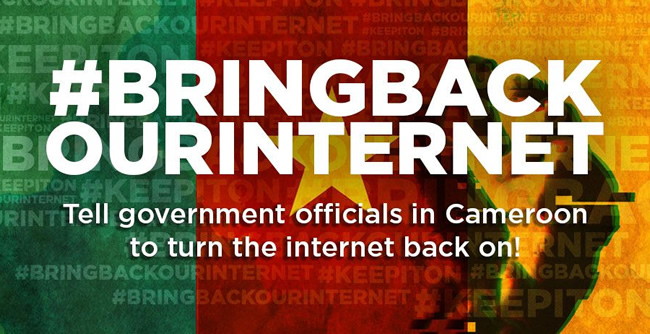The Centre for Human Rights, University of Pretoria is gravely concerned about the on-going human rights violations, particularly of the right to freedom of expression in the North West and South West regions of the Republic of Cameroon (English-speaking Cameroon).
Since 17 January 2017, internet connections have been completely shut down in English-speaking Cameroon, reportedly on the orders of the Ministry of Communications. This action is an apparent attempt to suppress the use of social media to mobilise the mass protests that have taken place in English-speaking Cameroon since November 2016. The Centre for Human Rights had on 17 February, expressed concern about the deteriorating human rights situation in English-speaking Cameroon, sighting ‘reports of arbitrary arrests, abductions, extra-judicial killings, involuntary disappearances, rape, torture and inhumane treatment of detainees, trial of civilians by military tribunals, shut down of internet services and the shutdown of schools’.
![]() Download this press statement in PDF
Download this press statement in PDF
Prior to the shutdown, the government had through various mediums expressed its displeasure at the impact of the social media in galvanizing protests, by linking it to terrorism. In particular, the government-run newspaper, the Cameroon Tribune, in an editorial published on 1 November 2016, referred to social media as ‘fast becoming a threat to peace and a secret instrument of manipulation’. Again, on 10 November the speaker of the National Assembly called the use of social media ‘a new form of terrorism as dangerous as a missile’.
This internet shutdown is occurring in the midst of various other violations of the right of freedom of expression as a direct attempt to suppress the protests. The Minister of Communications on 1 December 2016, wrote to independent television and radio stations, requesting that they desist from airing political debates on the ‘current political atmosphere in the south-west region’. There have also been reports of arbitrary arrests of journalists for covering the on-going protests.
These actions by the government of Cameroon are clear violations of the right to freedom of expression and access to information as guaranteed by article 9 of the African Charter on Human and Peoples’ Rights (African Charter) and article 19 of the International Covenant on Civil and Political Rights (ICCPR). Cameroon ratified the African Charter on 20 June 1989 and the ICCPR on 27 June 1984. The government of Cameroon is thus required to ensure that any interference with freedom of expression is provided by law, serves a legitimate aim and is such that is necessary and proportionate in a democratic society. A complete shutdown of the internet, which indiscriminately targets a specific segment of the country, can in no way be justified as necessary or proportionate.
In this regard, the Human Rights Council by Resolution 32/13 of June 2016, has condemned unequivocally, ‘measures to intentionally prevent or disrupt access to or dissemination of information online’ as a violation of international human rights law. Furthermore, the 2015 Joint Declaration by Special Mandate holders on Freedom of Expression which included the Special Rapporteur on Freedom of Expression and Access to Information in Africa and the United Nations Special Rapporteur on Freedom of Opinion and Expression, has stated that the shutting down of communication systems by States, ‘can never be justified under human rights law’.
In light of the above, the Centre for Human Rights makes the following call:
- The Government of Cameroon must immediately comply with its obligations under the African Charter and the ICCPR by immediately putting an end to the internet shutdown and take steps to address all other violations of the right to freedom of expression in Cameroon.
- The African Commission on Human and Peoples’ Rights and in particular its Special Rapporteur on Freedom of Expression and Access to Information should send an urgent letter of appeal to the government of Cameroon, urging its immediate compliance with its freedom of expression obligations under the African Charter by immediately putting an end to the internet shutdown and addressing all other violations of the right to freedom of expression.
- The African Commission on Human and Peoples’ Rights and in particular its Special Rapporteur on Freedom of Expression and Access to Information, should undertake an investigative mission to the Republic of Cameroon to investigate these and other cases of violations of freedom of expression and access to information and make appropriate recommendations to the African Commission, as a basis for further engagement with the Government of Cameroon.
- The UN Special Rapporteur should in addition to denouncing the actions of the government of Cameroon, undertake independently or in collaboration with the ACHPR Special Rapporteur, a fact-finding mission to Cameroon to investigate these and other cases of violations of the right to freedom of expression and access to information and engage with the government of Cameroon, with a view to ensuring compliance with its obligations under the ICCPR.
For more information, please contact:
Dr Ololade Shyllon
Programme Manager: Freedom of Expression and Access to Information
Centre for Human Rights, University of Pretoria
Tel: (012) 420 4199
Lola.Shyllon@up.az.za
www.chr.up.ac.za
